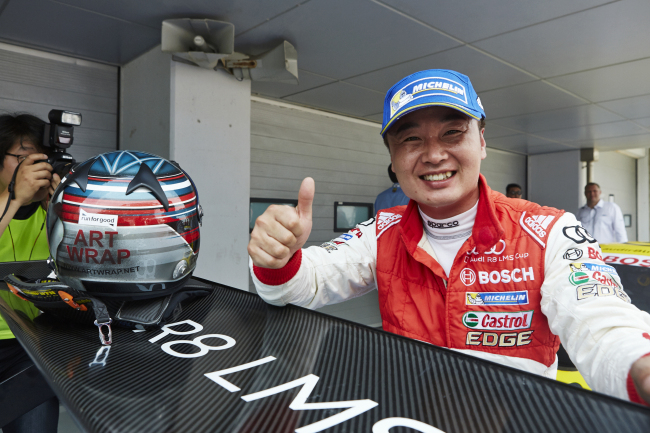[Weekender] ‘Car tune-ups for safety, not merely for looks’
By 손지영Published : March 11, 2016 - 19:12
In South Korea, car tuning -- the aftermarket modification of an automobile’s performance or appearance -- has long been portrayed under a negative light as an unnecessary practice that disturbs peace and order on the streets.
Although many still associate vehicle tune-ups with noisy, sometimes reckless, cars sporting ostentatious exteriors, there is reportedly a lot more to car tuning than looks alone.
“What most people don’t know is that the biggest merit of tuning up a car is ‘safety’,” said mechanic-turned-racer You Kyoung-ouk of Team Audi Korea in a recent interview with The Korea Herald.

“Upgrading key car components -- most notably a vehicle’s brake system and suspension -- can drastically improve a vehicle’s safety on top of performance,” said the racer who is recognized among local car enthusiasts for his expertise in motor mechanics and car tuning.
Though existing parts fitted inside finished vehicle are by no means problematic, the seasoned mechanic and racer said the upgraded parts used to tune-up a vehicle boast superior quality and performance compared to regular car parts.
For example, automobiles equipped with more advanced brake systems are able to halt to a stop at high speeds with less rebound, compared to their normal counterparts under the same conditions. The same goes for a car’s suspension. Installing a sturdier suspension system, an integral part of a car’s frame, can significantly reduce a car’s rolling -- leaning over when making sharp turns.
Though people rarely define car tuning as a practice that enhances a vehicle’s safety, those who have made the switch to more advanced parts can truly “feel the difference” in the car’s performance when driving on the road.
You, who began his career as an advanced mechanic before turning to professional car racing, is a seasoned expert on car tuning, making appearances on popular automotive television programs such as “The Bunker,” a popular local TV program that offers useful information on car customization.
The program has played a big part in expanding the car tuning culture in Korea, led today by mostly proactive male drivers in their 20s and 30s who, despite a tight budget, are bent on modifying their vehicles into personalized possessions.
The most popular models that are tuned up by such young drivers are the Hyundai Genesis Coupe, a mid-priced sports vehicle, as well as compact car models like Avante and Accent, said You, who closely monitors the local car tuning market.
Moreover, modern drivers tend to focus on altering a car’s exterior -- such as changing the color of the wrapping, dressing up the wheels or lowering the suspension. Though inner components such as brake systems are also popular candidates for replacements, engines are rarely touched nowadays.
The improved accessibility of advanced car parts in the market has also played a big part in lowering the bar for those seeking self-led car tune-ups, according to You.
Unlike before, a wider range of car parts are available for direct purchase through individual sellers who post their items on open-market platforms.
After finding a car component they want, customers can place a customized order from a reseller of their choice. When the item arrives, they can simply pay a small fee at a nearby repair center to install the new component.
“The components are quite affordable,” You said, noting that wrapping, the most popular form of car tuning, costs just 1.2 million won ($990) while exchanging a car’s suspension, wheel and tires costs around 1 million won.
With enhanced accessibility combined with the benefits of affordable pricing, industry watchers and the government expect the still-nascent domestic car tuning business to become a new growth engine for Korea’s automotive manufacturing industry.
Eyeing the segment’s growth potential and foreseen job creation effects, the Transport Ministry announced plans in 2014 to boost the country’s car tuning market, which included plans to relax existing regulations, build up a new car tuning support system and lead a public campaign to promote the benefits of car tuning.
Nonetheless, You said that the government still has to do “a lot more” to further ease current regulations on car tuning in order to enable the industry to grow into a bigger market that amplifies the strengths of Korea’s highly-advanced car manufacturing expertise.
For his part, the racer-mechanic is planning to help nurture more professional mechanics who can properly and safely install advanced car components, which are shrinking in numbers. You is scheduled to begin teaching as a professor at the Gyeonggi Technical Institute’s inaugural car tuning department starting from this August.
By Sohn Ji-young (jys@heraldcorp.com)






![[KH Explains] How should Korea adjust its trade defenses against Chinese EVs?](http://res.heraldm.com/phpwas/restmb_idxmake.php?idx=644&simg=/content/image/2024/04/15/20240415050562_0.jpg&u=20240415144419)











![[Today’s K-pop] Stray Kids to return soon: report](http://res.heraldm.com/phpwas/restmb_idxmake.php?idx=642&simg=/content/image/2024/04/16/20240416050713_0.jpg&u=)